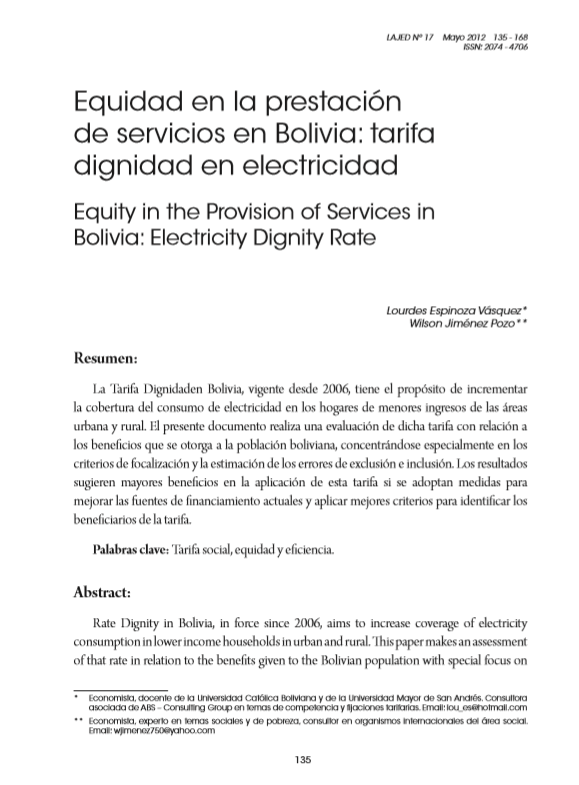Equity in the Provision of Services in Bolivia: Electricity Dignity Rate
DOI:
https://doi.org/10.35319/lajed.201217141Keywords:
Social Rate, Equity and EfficiencyAbstract
Rate Dignity in Bolivia, in force since 2006, aims to increase coverage of electricity consumption in lower income households in urban and rural. This paper makes an assessment of that rate in relation to the benefits given to the Bolivian population with special focus on targeting criteria and the estimation errors of exclusion and inclusion. The results suggest greater benefits in the application of this tariff measures are taken to improve the current funding sources and implement improved criteria for identifying beneficiaries of the tariff.
Downloads
References
Baldick, R., J. Kaye y F. Wu. (1992). Electricity Tariffs under imperfect knowledge of participant benefits. Transaction on Power Systems, Vol 7, Nº 4, November, 1471 - 1482
Boccanfuso, D., A. Estache y L. Savard (2008). Electricity Reforms in Senegal: A Macro–Micro Analysis of the Effects on Poverty and Distribution. Africa Infrastructure Country Diagnostic. Working Paper No.5.World Bank.
Bolivia. Gobierno Nacional. Autoridad de Fiscalización y Control Social de Electricidad; Anuario Estadístico 2010.
Bolivia. Gobierno Nacional. Autoridad de Fiscalización y Control Social de Electricidad; Pagina Web, Precios del Sistema Interconectado Nacional Gestiones 2008, 2009, 2010, 2011.
Bolivia. Gobierno Nacional. D.S. 28146 de 17 de mayo de 2005
Bolivia. Gobierno Nacional. D.S. 28427 de 28 de octubre de 2005
Bolivia. Gobierno Nacional. D.S. 28653 de 21 de marzo de 2006
Centro de Estudios de la Actividad Regulatoria Energética – CEARE (2009).Tarifa social en energía eléctrica. Una propuesta para el área de concesión nacional. Aragone F., V. Frasca, P. Mullner, H. Petrecca, C. Vargas; Buenos Aires, Noviembre.
Clark, A., M. Davis, A. Eberhard, K. Gratwick y N. Wamukonya(2005). Power sector reform in Africa: Assessing the impact on poor people. Graduate School of Business, University of Cape Town for ESMAP/World Bank.
Cont, W., P. Hancevic y F. Navajas (2008). Infraestructura y aspectos distributivos en la tarificación de los servicios públicos: ámbito y posibilidades de la tarifa social en la Argentina. Documento de Trabajo No. 2008/03 - Corporación Andina de Fomento.
Ente Nacional Regulador de la Electricidad de Argentina (ENRE). (2005). El objetivo de equidad distributiva en el diseño de las tarifas de distribución de energía eléctrica. Molina J. C.; Uruguay, Abril.
Marchionni, M., W. Sosa Escudero y J. Alejo. (2008). Efectos distributivos de esquemas alternativos de tarifas sociales: una exploración cuantitativa. Documento de trabajo Nº 69, Argentina, Mayo.
Sotkiewicz, P. M. (2002). “Cross-Subsidies That Minimize Electricity Consumption Distortions”. Public Utility Research Center. Warrington College of Business, University of Florida.
Silva, P., I. Klytchniova y D. Radevic.(2007). Poverty and Environmental Impacts of Electricity Price Reforms in Montenegro. Economic and Social Research Council – World Bank.
World Bank (2004). “Ghana Poverty and Social Impact Analysis (PSIA)”. Electricity Tariffs: Phase I. Government of Ghana, Ministry of Energy, PSIA Steering Committee. Washington.






